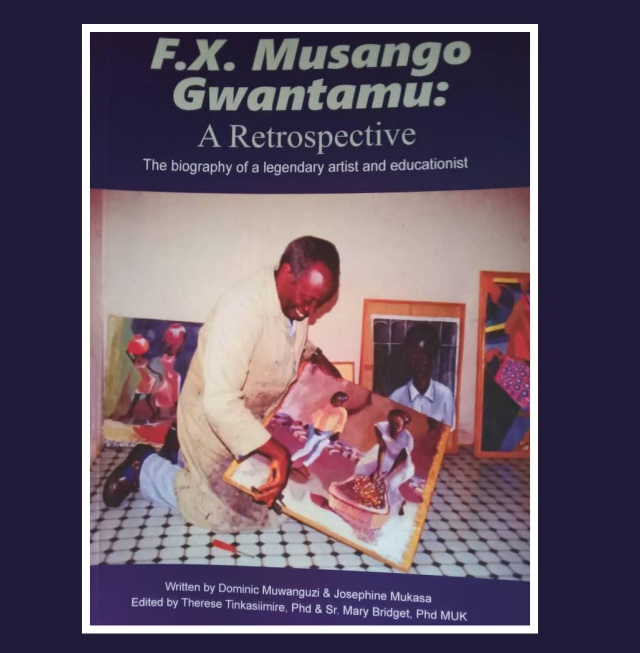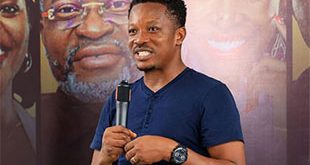
A biography of Uganda’s leading art educationist and artist who inspired artists like Joseph Ntensibe, General Elly Tumwine and Fabian Mpagi
ARTS | DOMINIC MUWANGUZI | The Uganda art industry has been recently touted to have a lot of potential and to grow exponentially in the next decade. But it surely lacks terribly on art literature. There is little writing on the history of both modern and contemporary art from Uganda, save a few research articles by art academics like Associate Prof. George Kyeyune and Dr. Angelo Kakande. Previous writings on modern art in Uganda are by Margret Trowel who saw it befitting to document her activities as a form of inspiration to later generations of artists and researchers. Perhaps, without her foresight there would be nothing to recall on the genesis of art teaching and practice in Uganda.
The book F.X MusangoGwantumu: A Retrospective is born out of this necessity to bridge the gap between the past and present. With acknowledgment and appreciation of the two frontiers, the future- who incidentally are the young artists- is easily attainable and more meaningful. Luckily the book is dedicated to the young artists who form the bulk of artists in full practice today. In essence, the subject, Prof. Musango- like he was fondly known- had a love and passion for young artists who he believed possessed the hope and future of Ugandan art. It may also have been possible that these young people reminded him of himself and saw it appropriate to support them to excel in life.
The visionary quality in Musango’s personality both as a teacher and artist is the major theme in the book. In the introduction of the book, his cousin Josephine Mukasa a senior lecturer at Nkumba University in the Department of Industrial art acknowledges his support in her career. She writes that it is because of his inspiration and guidance that she became an artist and art teacher. More so, she identifies Musango as a dedicated, intelligent and hardworking man she admired from the onset of their first interaction. Incidentally, it is the same qualities General Elly Tumwine (RIP) who was his student at St. Henry’s College Kitovu, he quoted in the Catalogue “40 years, 40 canvases Art Exhibition”. Tumwine wrote that it is because of Musango that he became an artist over his former ambition of becoming a lawyer.
In the following chapters of the book, Musango’s personality as a hardworking, open-minded and ruthless art teacher is widely discussed. In Chapter Three, the educationist’s traits as a hardworking and open minded man earn him a part time teaching appointment at Margaret Trowel School of Fine art. Within a few years, he manages to make himself indispensable by his dynamic approach to art teaching; emphasizing a fusion of technical prowess with theoretical approach among his students. His tough stance in teaching studio practice earned him love and respect among his students; albeit numerous subdued feelings of resentment. But he was convinced more than anyone else that such methodology of teaching would yield better results for his students. Suffice to say, more than three quarters of the teaching staff at Makerere, Nkumba and Kyambogo in the department of Fine art were his students!
This feat definitely qualifies him as a dynamic and dedicated art teacher cut out of a fabric of extreme rare quality. In Chapter Four and Five, Musango as a Dean of the art school, goes to greater lengths to mobilize resources for the art faculty that had been decimated by the long period of political unrest. He is ingenious enough to create partnerships with international development agencies that had come to the country in the early 1990s.
The working partnership with United Nations Development Program that saw Dr. Rose Kirumira build a sculpture that was to represent the activities of the multi national development organization in Uganda opened up possibilities of young artists to work on bigger projects. The idea was to train the young artists in studio competence while linking them to these international agencies that had a broad network of stakeholders in different sectors. Equally, the partnership would benefit the institution in terms of international visibility and recognition, subsequently leading to funding and academic exchange programs.
The outcome of such strategy as discussed in the book is that several students from the faculty like Phillip Kwesiga and George Kyeyune got international scholarships. This was a motivation for their peers to excel in their practice and also enjoy such international visibility and recognition.
The legacy of Musango documented in this book is interestingly not a celebration of an individual’s success built on personal effort. The author is deliberate to evoke the subject’s background as a child that was characterized by strict moral upbringing and belief in God. Undoubtedly, the author believes without a strong and good background filled with Christian values like trust in God, patience, honesty and humility, success is never attainable. These virtues well aligned with hard work and determination conspired to Musango’s exceptional success story. Therefore beyond anything else, Musango’s story told through the pages can be used as a source of inspiration for not only young artists, but every other individual who want to make a difference in the life of others.
****
The book is available on sale at Makerere art gallery and AKA gallery, Bukoto street, next to Alliance Francaise and German Cultural Center Offices Kampala.
 The Independent Uganda: You get the Truth we Pay the Price
The Independent Uganda: You get the Truth we Pay the Price



